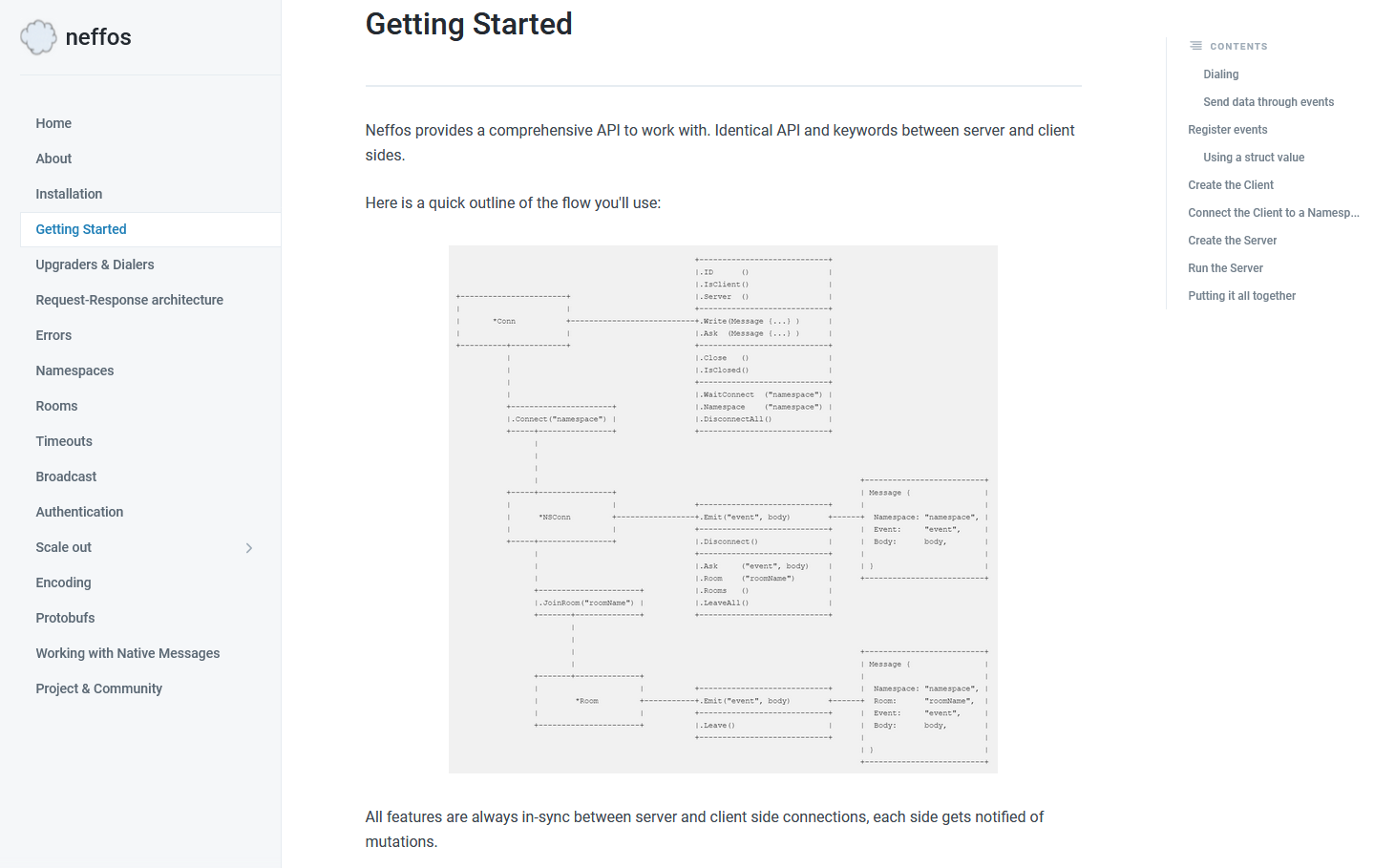Neffos is a cross-platform real-time framework with expressive, elegant API written in Go. Neffos takes the pain out of development by easing common tasks used in real-time backend and frontend applications such as:
- Scale-out using redis or nats*
- Adaptive request upgradation and server dialing
- Acknowledgements
- Namespaces
- Rooms
- Broadcast
- Event-Driven architecture
- Request-Response architecture
- Error Awareness
- Asynchronous Broadcast
- Timeouts
- Encoding
- Reconnection
- Modern neffos API client for Browsers, Nodejs* and Go
Quick View
import (
// [...]
"github.com/kataras/neffos"
"github.com/kataras/neffos/gorilla"
)
func runServer() {
events := make(neffos.Namespaces)
events.On("/v1", "workday", func(ns *neffos.NSConn, msg neffos.Message) error {
date := string(msg.Body)
t, err := time.Parse("01-02-2006", date)
if err != nil {
if n := ns.Conn.Increment("tries"); n >= 3 && n%3 == 0 {
// Return custom error text to the client.
return fmt.Errorf("Why not try this one? 06-24-2019")
} else if n >= 6 && n%2 == 0 {
// Fire the "notify" client event.
ns.Emit("notify", []byte("What are you doing?"))
}
// Return the parse error back to the client.
return err
}
weekday := t.Weekday()
if weekday == time.Saturday || weekday == time.Sunday {
return neffos.Reply([]byte("day off"))
}
// Reply back to the client.
responseText := fmt.Sprintf("it's %s, do your job.", weekday)
return neffos.Reply([]byte(responseText))
})
websocketServer := neffos.New(gorilla.DefaultUpgrader, events)
// Fire the "/v1:notify" event to all clients after server's 1 minute.
time.AfterFunc(1*time.Minute, func() {
websocketServer.Broadcast(nil, neffos.Message{
Namespace: "/v1",
Event: "notify",
Body: []byte("server is up and running for 1 minute"),
})
})
router := http.NewServeMux()
router.Handle("/", websocketServer)
log.Println("Serving websockets on localhost:8080")
log.Fatal(http.ListenAndServe(":8080", router))
}func runClient() {
ctx := context.TODO()
events := make(neffos.Namespaces)
events.On("/v1", "notify", func(c *neffos.NSConn, msg neffos.Message) error {
log.Printf("Server says: %s\n", string(msg.Body))
return nil
})
// Connect to the server.
client, err := neffos.Dial(ctx,
gorilla.DefaultDialer,
"ws://localhost:8080",
events)
if err != nil {
panic(err)
}
// Connect to a namespace.
c, err := client.Connect(ctx, "/v1")
if err != nil {
panic(err)
}
fmt.Println("Please specify a date of format: mm-dd-yyyy")
for {
fmt.Print(">> ")
var date string
fmt.Scanf("%s", &date)
// Send to the server and wait reply to this message.
response, err := c.Ask(ctx, "workday", []byte(date))
if err != nil {
if neffos.IsCloseError(err) {
// Check if the error is a close signal,
// or make use of the `<- client.NotifyClose`
// read-only channel instead.
break
}
// >> 13-29-2019
// error received: parsing time "13-29-2019": month out of range
fmt.Printf("error received: %v\n", err)
continue
}
// >> 06-29-2019
// it's a day off!
//
// >> 06-24-2019
// it's Monday, do your job.
fmt.Println(string(response.Body))
}
}Navigate to: https://github.com/kataras/neffos.js
Neffos contains extensive and thorough wiki making it easy to get started with the framework.
For a more detailed technical documentation you can head over to our godocs. And for executable code you can always visit the _examples repository's subdirectory.
You can download a PDF version of the E-Book today and be participated in the development of neffos.
We'd love to see your contribution to the neffos real-time framework! For more information about contributing to the neffos project please check the CONTRIBUTING.md file.
- neffos-contrib github organisation for more programming languages support, please invite yourself.
If you discover a security vulnerability within neffos, please send an e-mail to [email protected]. All security vulnerabilities will be promptly addressed.
The word "neffos" has a greek origin and it is translated to "cloud" in English dictionary.
This project is licensed under the MIT license.


















